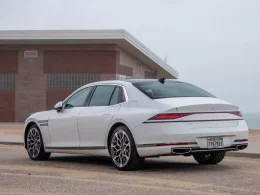Introduction
In an era where electric vehicles (EVs) are gaining momentum as the future of transportation, automakers worldwide are stepping up their game to revolutionize the road. Among these companies, Toyota, a leading automobile manufacturer known for its commitment to innovation and reliability, has set its sights on selling millions of EVs. With a comprehensive strategy outlined by their technology chief, Toyota is poised to make a significant impact on the EV market. In this article, we will delve into the key aspects of Toyota’s gameplan, highlighting their technological advancements, market positioning, and sustainable vision for a greener future.
Toyota’s Technological Innovations
1. Advanced Battery Technology
To achieve their ambitious EV sales targets, Toyota has placed a strong emphasis on developing advanced battery technology. By leveraging their extensive research and development capabilities, they have made significant breakthroughs in battery efficiency, capacity, and charging speed. Toyota’s cutting-edge solid-state battery technology promises longer ranges, shorter charging times, and enhanced overall performance, thereby addressing one of the major concerns surrounding EV adoption.
2. Intelligent Mobility Solutions
Toyota recognizes that the success of EVs depends not only on their powertrain but also on the integration of intelligent mobility solutions. Through extensive collaboration with tech companies and artificial intelligence (AI) experts, Toyota has been able to incorporate smart features into their EV lineup. These include advanced driver assistance systems, predictive analytics for optimized charging and route planning, and seamless connectivity options, ensuring a safe, convenient, and futuristic driving experience.
Market Positioning and Sales Strategy
1. Diverse EV Portfolio
Toyota understands the importance of catering to diverse consumer needs and preferences. Their gameplan involves the introduction of a wide range of EV models spanning different segments, from compact city cars to spacious SUVs. By offering a comprehensive portfolio, Toyota aims to appeal to a broad customer base, capturing the attention of both environmentally conscious individuals and those seeking high-performance electric vehicles.
2. Competitive Pricing
Recognizing the significance of price competitiveness in the EV market, Toyota has devised a strategy to offer their EVs at competitive price points. Leveraging their extensive supply chain networks and economies of scale, they aim to make EVs more accessible to the mass market. This pricing strategy, coupled with the brand’s reputation for reliability, is expected to position Toyota as a strong contender in the EV race.
3. Expanding Charging Infrastructure
Toyota understands that the success of EVs hinges on the availability of a robust charging infrastructure. To address this concern, they have invested heavily in expanding the charging network, collaborating with governments, utility companies, and other stakeholders. By ensuring widespread access to fast and reliable charging stations, Toyota aims to alleviate range anxiety and promote EV adoption on a global scale.
Toyota’s Sustainable Vision
Toyota’s gameplan for selling millions of EVs extends beyond sales figures. As a company committed to sustainability, they aim to create a greener future by reducing carbon emissions and promoting a circular economy. Their initiatives include:
1. Renewable Energy Integration
Toyota is actively exploring partnerships and investments in renewable energy sources, such as solar and wind power. By integrating renewable energy into their manufacturing processes and charging infrastructure, they aim to reduce the overall carbon footprint associated with their EV production and usage.
2. Battery Recycling and Reuse
Recognizing the environmental impact of battery disposal, Toyota has developed comprehensive programs for battery recycling and reuse. Through strategic collaborations with recycling companies, they aim to minimize waste and maximize the lifecycle of their EV batteries. This approach aligns with their vision of a circular economy, where resources are utilized efficiently and sustainably.
3. Collaborations for Innovation
Toyota understands that achieving their gameplan requires collaborative efforts with various stakeholders, including governments, research institutions, and other automakers. By fostering partnerships, they aim to drive innovation, share knowledge, and collectively address the challenges associated with widespread EV adoption. This collaborative approach reflects Toyota’s commitment to shaping a sustainable mobility ecosystem.
Conclusion
Toyota’s technology chief has mapped out a comprehensive gameplan aimed at selling millions of EVs and revolutionizing the road. Through their technological innovations, market positioning strategies, and sustainable vision, Toyota is well-equipped to make a significant impact on the EV market. By prioritizing advanced battery technology, intelligent mobility solutions, and a diverse EV portfolio, they are addressing consumer needs and preferences while ensuring a seamless transition to electric mobility. Furthermore, their commitment to sustainability, reflected in renewable energy integration and battery recycling programs, solidifies their position as a responsible and forward-thinking automaker. With Toyota leading the charge, the future of transportation is poised to be greener, more efficient, and sustainable.












